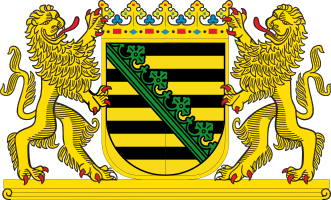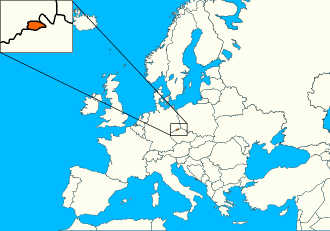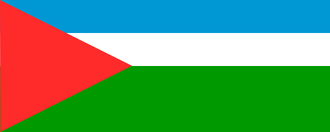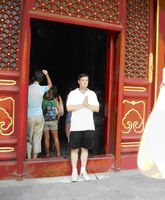Ruritania

Your situation: You are a member of the American International Foundation—a foreign policy think tank located along Embassy Row in the District of Columbia. The current Director of National Intelligence has come to you for your input of what the administration should do, if anything, to the unfolding events in the small European state of Ruritania.
You may download documents relating to Ruritania here: Introduction.
Brief Background on Ruritania
Ruritania (officially: Řuritá království) is an autocratic kingdom surrounded by Germany and the Czech Republic. Its inhabitants are Slavonic-speaking Roman Catholics under an absolute monarchy. King Rudolf II recently died, and his grandson, Rudolf V, is to be crowned in a fortnight.
Geography

Ruritania is a small (62 mi2; 161 km2) land-locked state in central Europe. It is located between southern Germany (Saxony) and western Czech Republic (Bohemia). The land is a beautiful combination of high mountains in the west (the Ruritanian Alps) and rolling farmland in the east (the Ruritanian Veldt).
Government
Ruritania is an autocratic kingdom, not a constitutional monarchy; the king rules as he sees fit. The king is advised by a council of ministers that he selects. These ministers do not have to be citizens of Ruritania. The current council is composed of five Ruritanians and one Nebraskan: the current Minister of Economics, who is Yale-educated and from South O. These councilors also perform the tasks of a ‘Committee King’ when the king is unable to perform his duties as Head of State and/or Head of Government.
The official capital city, Strešlau, lies on the railway line between Dresden and Prague and has a population of 9,300. The royal capital, Sčwånstein, has a population of 2,800 and lies on a spur (branch) line. According to the 2001 census, the total population of Ruritania is 14,000, with 90% of the population living in its three cities: Strešlau, Sčwånstein, and Děčín (population, 500).
Economics

The deceased king, Rudolf II, was an able administrator and businessman. As such, he was able to lift many Ruritanians out of poverty. When he took power in 1944, the GDP per capita (PPP) was approximately US$50, with a poverty rate of 99%. Today, it is approximately US$55,000 (the eighth highest in the world), with a poverty rate of 50%.
The primary source of revenue for Ruritania is its banking industry—the source of 75% of its GDP. The remainder comes from tourism (15%) and agriculture (10%). Ruritania’s tourism industry primarily bases itself on winter recreation in the west. Because of favorable visa requirements, low costs for hotels, and fantastic skiing in its alps, Ruritania is the destination of choice for vacationers from (in descending order of visitors) the Czech Republic, Germany, Turkey, Oman, Morocco, United States, and Spain.
The primary crops are corn (55%), winter wheat (25%), and hazelnuts (15%). What corn is not eaten is exported to Germany (75%) and the Czech Republic (25%). Similar export patterns hold for winter wheat. Hazelnut exports go to the Czech Republic (40%), Germany (35%), and Switzerland (25%), where they are turned into delicious confections. Imports to Ruritania come from Russia, Turkey, and Oman (petroleum), and the Czech Republic and Germany (manufactured goods and foodstuffs).
Because of the strength of the monarchy, Ruritania is neither a production point nor a transshipping point for drugs. Illicit drug use is the lowest in Europe, with approximately 0.2% of the population using marijuana, and none using harder drugs.
Ascension talks between Ruritania and the European Union have, unfortunately, stalled. The two issues are the deficiency of democratic structures and excess of controls on the press. Regardless of not being a member of the European Union, or of its monetary union, Rudolf II pegged the Ruritanian Crown (Koruna Řuritá) to the Euro at 2.00 Kř to €1.00. This offers greater stability for the koruna in the currency market. Three decades ago, economic reform has allowed the koruna to be entirely convertible on the world market. It also eliminated the black market in Ruritania.
US–Ruritanian Relations
The United States and Ruritania share full diplomatic recognition. However, the United States does not have an ambassador to Ruritania, specifically. The US interests in Ruritania are handled by the US Ambassador to Poland, Victor Ashe. This is not an unusual circumstance, as embassies are quite expensive. Unfortunately, this reduces the amount of reliable information coming out of Ruritania.

Václav od Plzeňa is the Ruritanian Ambassador to the United States, occupying the Ruritanian Embassy on Massachusetts Avenue, next to the Embassy of the Republic of Ireland. Unfortunately, His Excellency is not much help; he can usually be found at the Brickskeller (a bar) on Dupont Circle about two blocks from the Embassy. As it currently stands, our information comes from only two places: the official, state-run newspaper of Ruritania (Řurité Noviny), and a group of 15 Ruritanian émigrés, who were exiled to Amsterdam from Ruritania twenty years ago by King Rudolph for anti-government activities. Rudolph claims they were vociferously disrupting the economic system with communist propaganda, calling for his overthrow and replacement with an anarcho-syndicalist government.
King Rudolf was a loyal supporter of the United States during the Cold War. However, with the geographic position of his country in the world (surrounded by Soviet satellite states), he was unable to offer the United States anything other than intermittently vocal, moral support. For fear of losing sovereignty, Rudolf often kept quiet and followed the lead of the Soviet Union in all but domestic economic matters.

When the Soviet Union fell, Rudolf increased his vocal support of the United States and its efforts to bring peace and prosperity to the world. As Rudolf often pointed out to various US presidents, Ruritania has never seen one of its sons die in battle. With his declining health and advancing age, Rudolf became much vehement in his support of the United States, especially with respect to the Global War on Terrorism.
It appears as though this relationship is very important to the current US Administration. Not only has President Bush often spoken warmly of Rudolph and spent one of his vacations in the Ruritanian Alps, but both the President and the First Lady traveled to Sčwånstein to personally apologize for a public gaff by then–US Secretary of Defense Rumsfeld, who told an ageless joke during a press interview on the Iraq War:
Q: Why do Ruritanian dogs have flat faces?
A: From chasing parked cars.
A: From chasing parked cars.
The old king finally died. The circumstances are a bit hazy. Official word from Řurité Noviny holds that the king died in his sleep. However, our sources tell us that the king’s body was found on the floor of the garage with flecks of foam around his mouth. The heir-apparent, Rudolf V, is not releasing the body for examination; he asserts that it would be desecration of the memory of his grandfather, especially as the old king died naturally in his sleep.
The Current Situation
The above information is all publicly known. Vice Admiral John Michael McConnell, Director of National Intelligence, has come to you with the following additional information, which is not publicly known. Again, your input for what the administration should do (if anything) to the unfolding events in Ruritania is sincerely requested.
- Our informants tell us that the heir-apparent, HRH Prince Rudolf V, personally poisoned his grandfather (Rudolf II) to ascend the throne. Additionally, the exiles tell us that Rudolf V also poisoned his father (Rudolf III) and all three of his uncles (Rudolf IV, Ludwig XXI, and Václav II). The exiles claim that it was for pointing this out, not for their political activities, that Rudolph II had them exiled from Ruritania.
- Rudolf V was a vocal critic of his grandfather and of the United States. Rudolf V spent fifteen years in the Soviet Union and received a graduate degree in Political Science from Moscow State University, learning the complexities of the Soviet style of government. Even with the end of the Cold War, Rudolf V has not quieted his rhetoric against either the United States or the running-dog capitalist world.
-
We have intelligence showing Rudolf V financially supported the following terrorist groups: Hezbollah, Greenpeace, the Baader-Meinhof Group, and the Earth Liberation Front.
While we currently have no evidence that he has any connections with either Osama bin Laden or al Qaeda, we do know Rudolf V and Sulaiman Abu Ghaith, al Qaeda’s official spokesman, were in Prague at the same time in February 2002. Despite this clandestine rendezvous, Rudolf V is outspoken against fundamentalism in the world (both Islamic and Christian). He is also a vocal critic of the “policies of the Zionist state” (Israel) in the Middle East. - Rudolf has never called for the overthrow of the United States government. He has never suggested that Ruritania enter in a war against the United States. He has publicly, and often, called for the continuation of Ruritania’s historic neutrality in wars. He said in a recent interview with České Noviny, a privately-owned Czech newspaper that he wishes to be able to die knowing that no Ruritanian had to die in a war while he was king.
- There are no groups inside Ruritania agitating for the overthrow of the monarchy, much less dedicated to it. Whether this is a function of the strongly autocratic government or of the high level of devotion given to the well-loved king, we dare not comment.
- This love-fest, obviously, does not include the 15 exiles living in Amsterdam.
- The coronation of Rudolf V will take place in 14 days. The US Administration has until then to make a final determination of its immediate course of action with respect to Ruritania and HRH Rudolph V.
![Flag of Ruritania [=]](ruritania/flag15-rk.png) 19..2008
19..2008